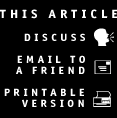 |
|
|
I Think ICANN By Wendy Rickard editor@isoc.org Back in 1994, I attended an InternetWorld conference and was given a button with the slogan "Imminent Death of the Net Predicted." Although that phrase quickly became old hat, predictions about the direction of the Net are de rigueur this time of year. So it certainly seemed strange when I went surfing for 1999 predictions about the Net and came up empty. Is no one willing to go out on a limb and state what great Net-related events we can expect on the horizon this year, I wondered? Or, because I am writing this in December, are they simply waiting for the new year to get under way before consulting the crystal ball? Physicist Freeman Dyson, in an interview several years ago with a small, local newspaper in his home state of New Jersey, admitted without hesitation that not one scientific prediction he had made in his lifetime had ever come true, at least not in the time frame he'd imagined. I've often felt that way about my horoscope. It's comforting to know the same holds true in science. Having given up my hunt for 1999 forecasts, I found myself perusing documents issued in early 1998 offering predictions for that year. In light of what really occurred in 1998--culmination of the browser wars in the form of an indictment by the U.S. Justice Department against Microsoft, the end of the U.S. government's funding of the Internet Assigned Numbers Authority (IANA), formation of the Internet Corporation for Assigned Names and Numbers (ICANN), and the death of Jon Postel--the predictions that appeared for 1998 seem tame. Certainly, intense commercial interest in the Internet was bound to draw considerable attention to the ways domains on the Net are actually administered. And concern over how well that system could scale--technically, logistically, and fairly--was not irrational. So it's not surprising that the activities of IANA, an organization that has functioned almost anonymously for more than 25 years, would become the center of the some of the year's hottest debates. The real turning point for the Internet, however, came when the U.S. government--which began expressing four years ago a desire to remove itself from the domain name management functions of the Internet--did so by ending its funding of the technical administrative functions of the Internet and those activities moved to a nonprofit corporation: ICANN. It seems the era of Internet self-governance is upon us. Without Postel a new, albeit interim, leadership was needed for the formation of ICANN, an organization whose acronym conveys an interesting optimism in the face of considerable heat. Postel was a seasoned technologist and a trained computer scientist, who had an uncanny ability to spot--and fashion--elegantly designed systems. The individuals representing the new leadership are certainly no strangers to the Internet, and they bring to the table a valuable set of skills. Mike Roberts, former vice president of Educom and first executive director of the Internet Society, at one time ran the campus computing department at Stanford University. These days he is better known for his policy expertise and his extensive knowledge of legislative issues related to telecommunications. Esther Dyson, daughter of Freeman Dyson, is best known as publisher of Release 1.0, a well-regarded industry newsletter that forecasts and analyzes technology trends, and as the organizer and host of a high-end industry forum for technology leaders. From a historical perspective, the events of 1998 bring to the fore issues that have been percolating for years. Although the technology itself will always have core relevance, equally important today are issues of Internet policy, economics, and justice. ICANN is in the tricky, unenviable position of having to navigate the Internet into an unknown future. That may have always been true of the Internet, but few could argue that the stakes today are higher than ever before. The new organization needs to be technically adept, expert in diplomacy, sensitive to diverse needs, visionary, and assertive. It needs to be able to lead and to facilitate. It needs to maintain balance while demonstrating fearlessness. It needs to please everyone when such is simply not possible. Postel was a one-man band. ICANN is not--and cannot--be that. Nor should it be. In a sense we experienced in 1998 the turning point we've all been predicting. We can choose to sit back and see what the ICANN will do, or we can choose to become more involved so as to ensure the long-term health of the Internet. If we do choose to become involved, we can be sure that ICANN can do what it hopes it can. |

